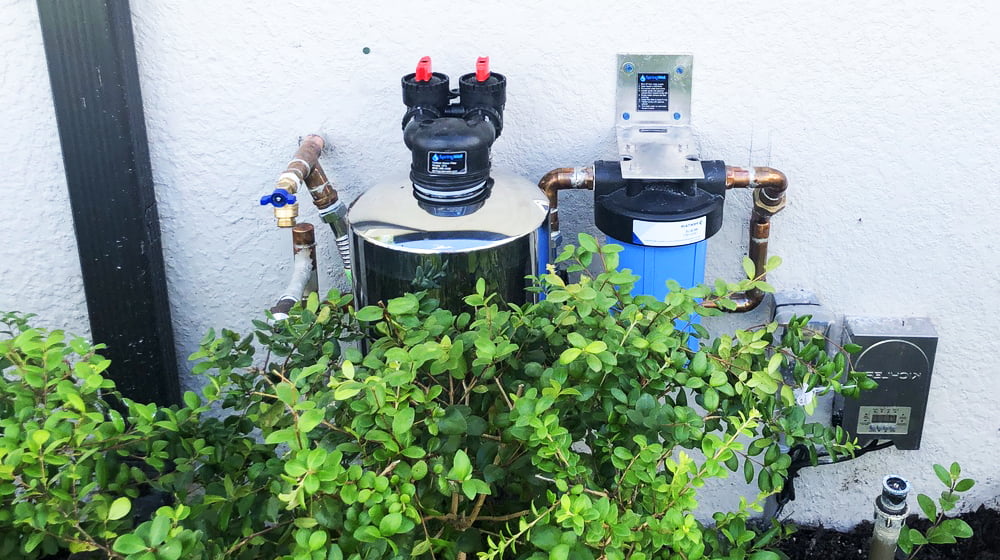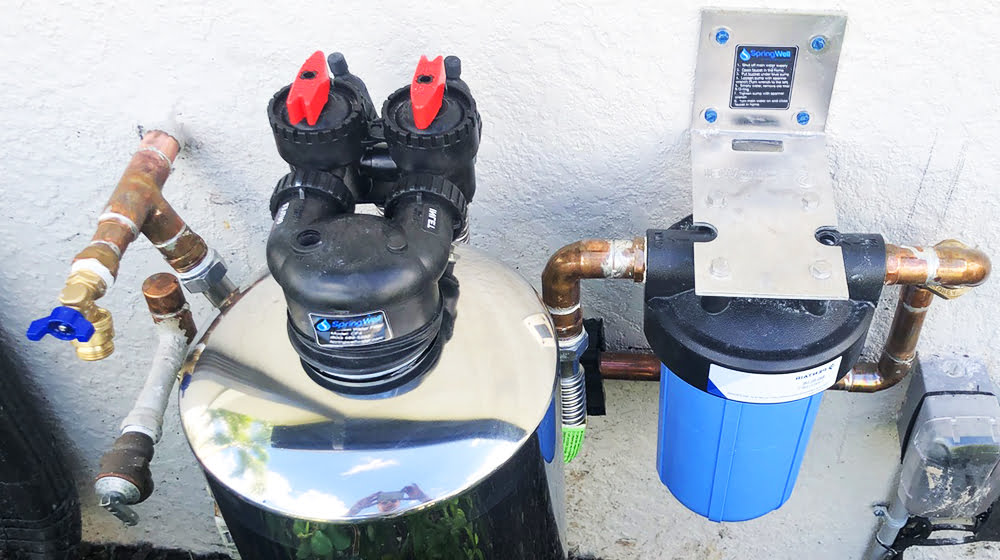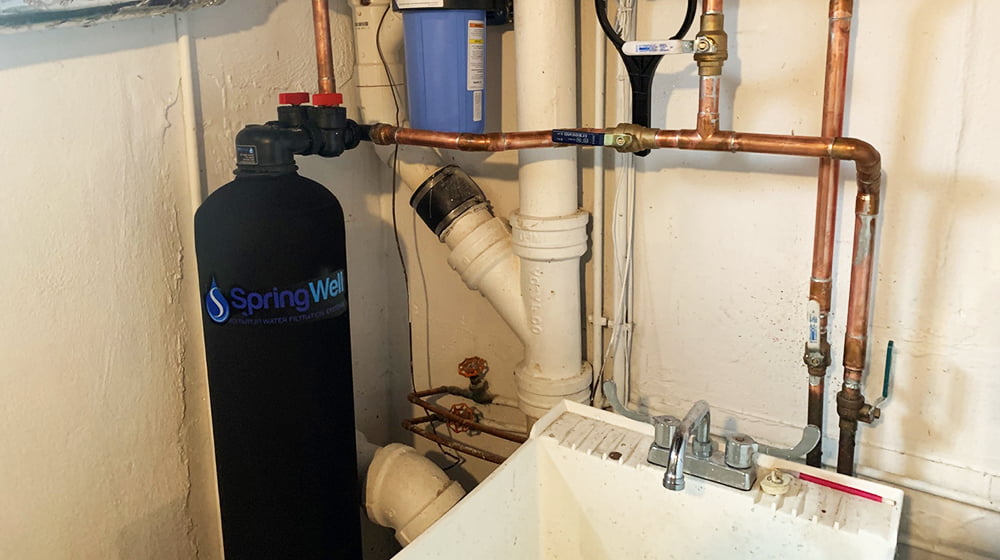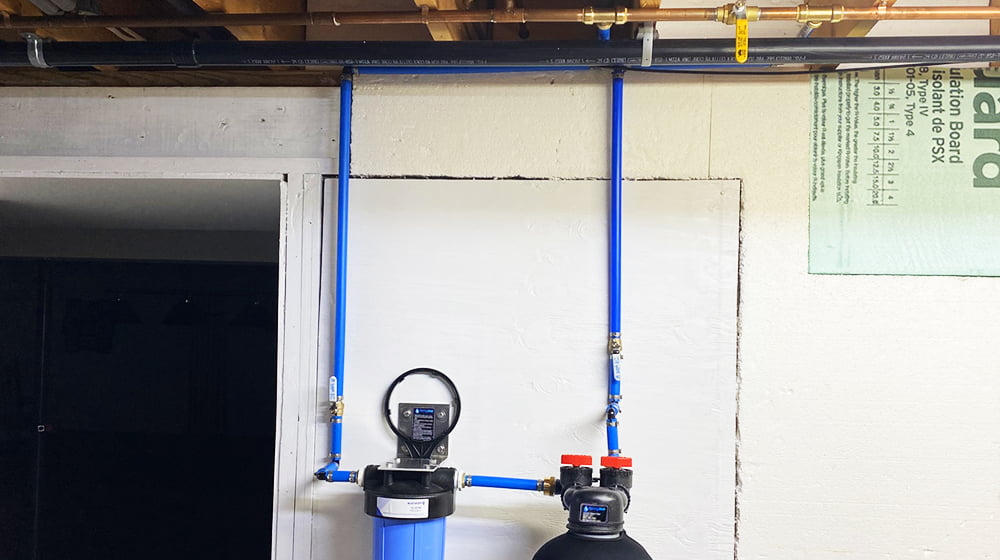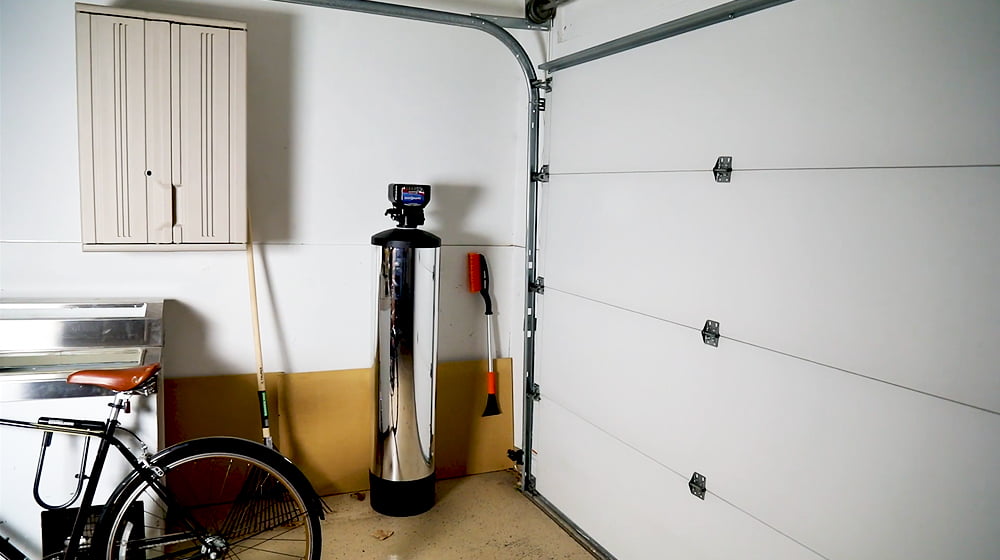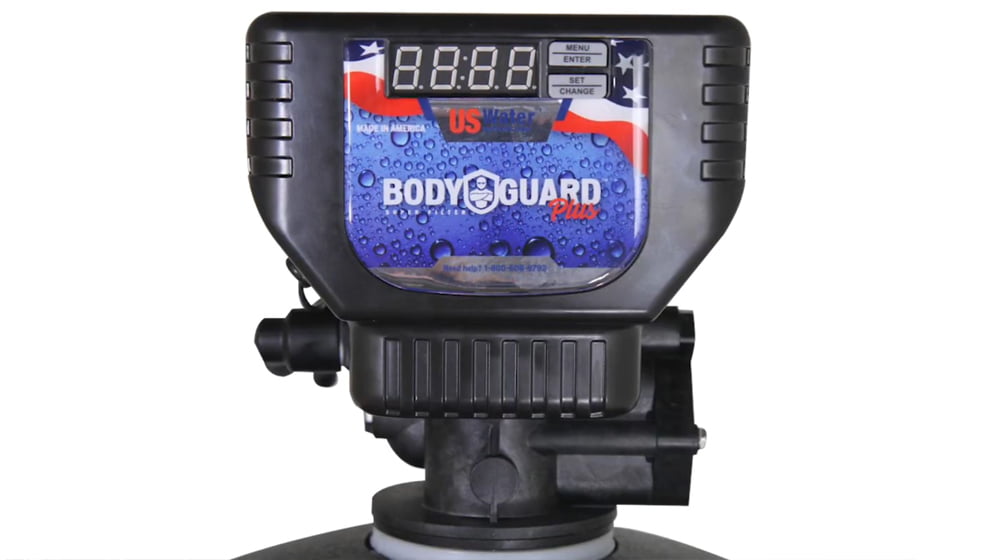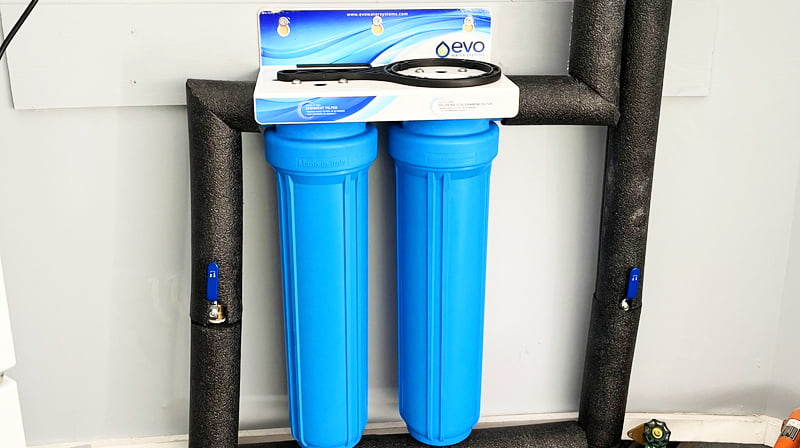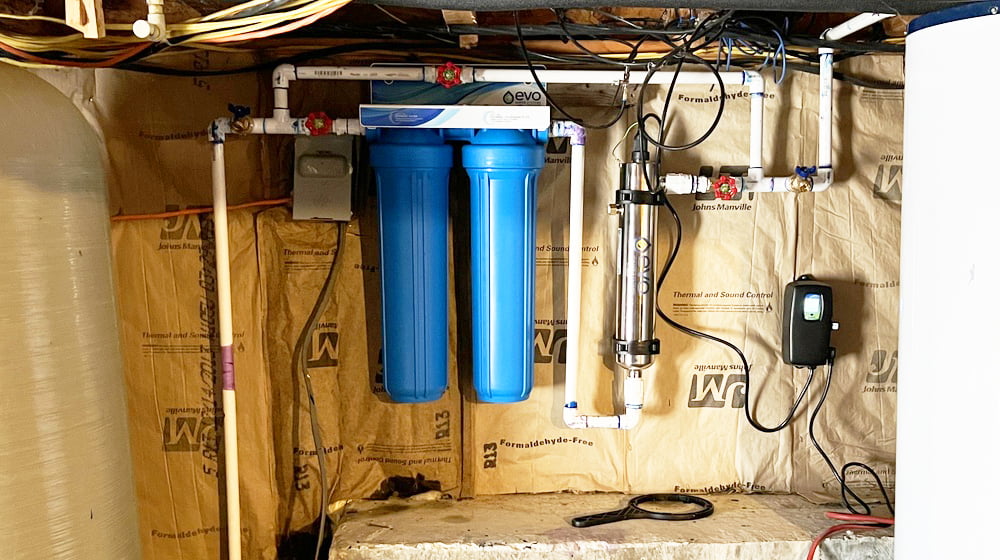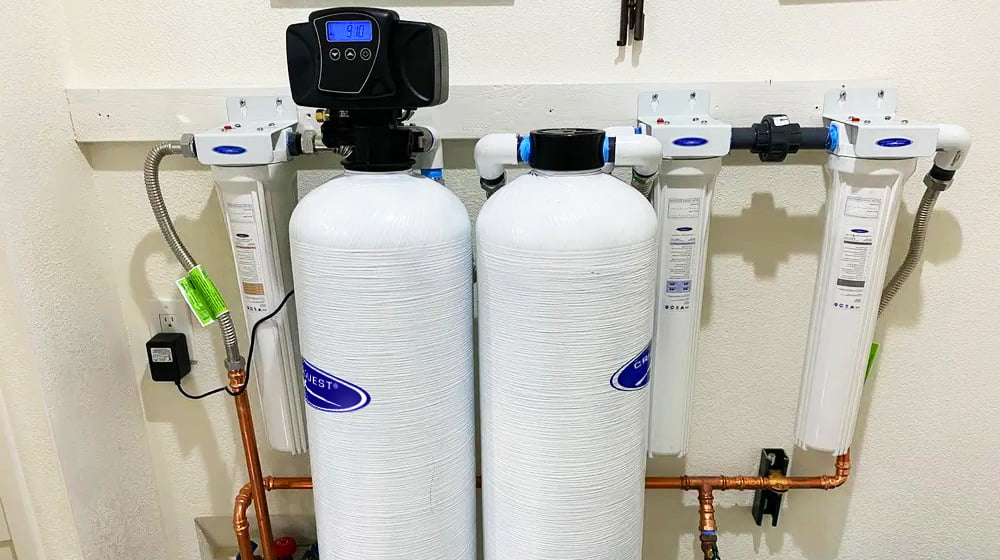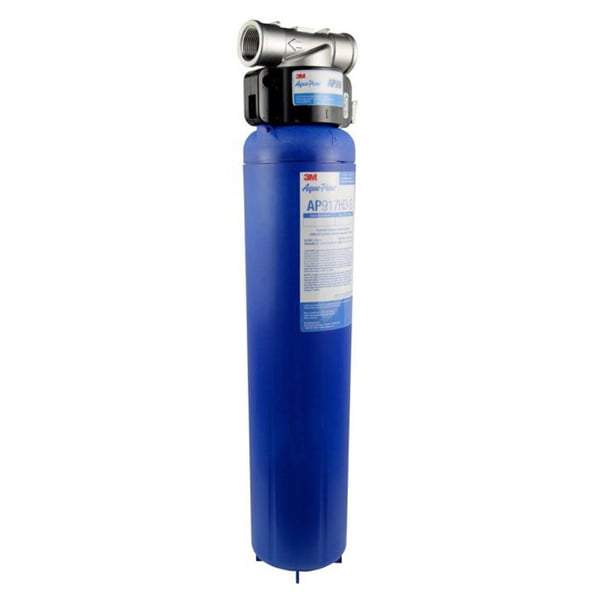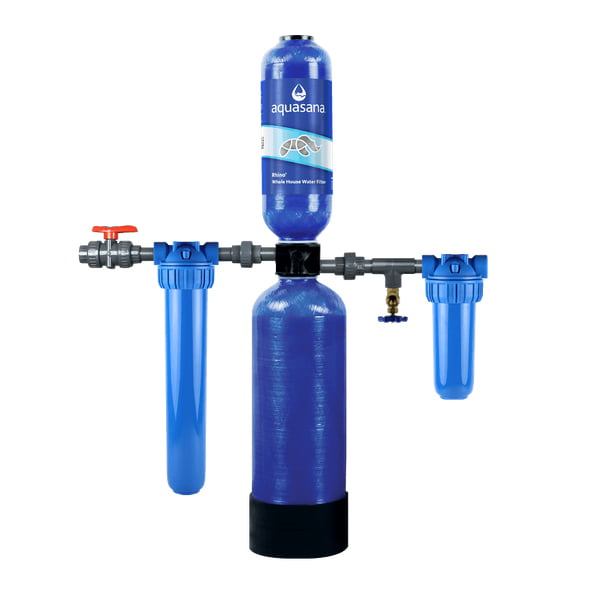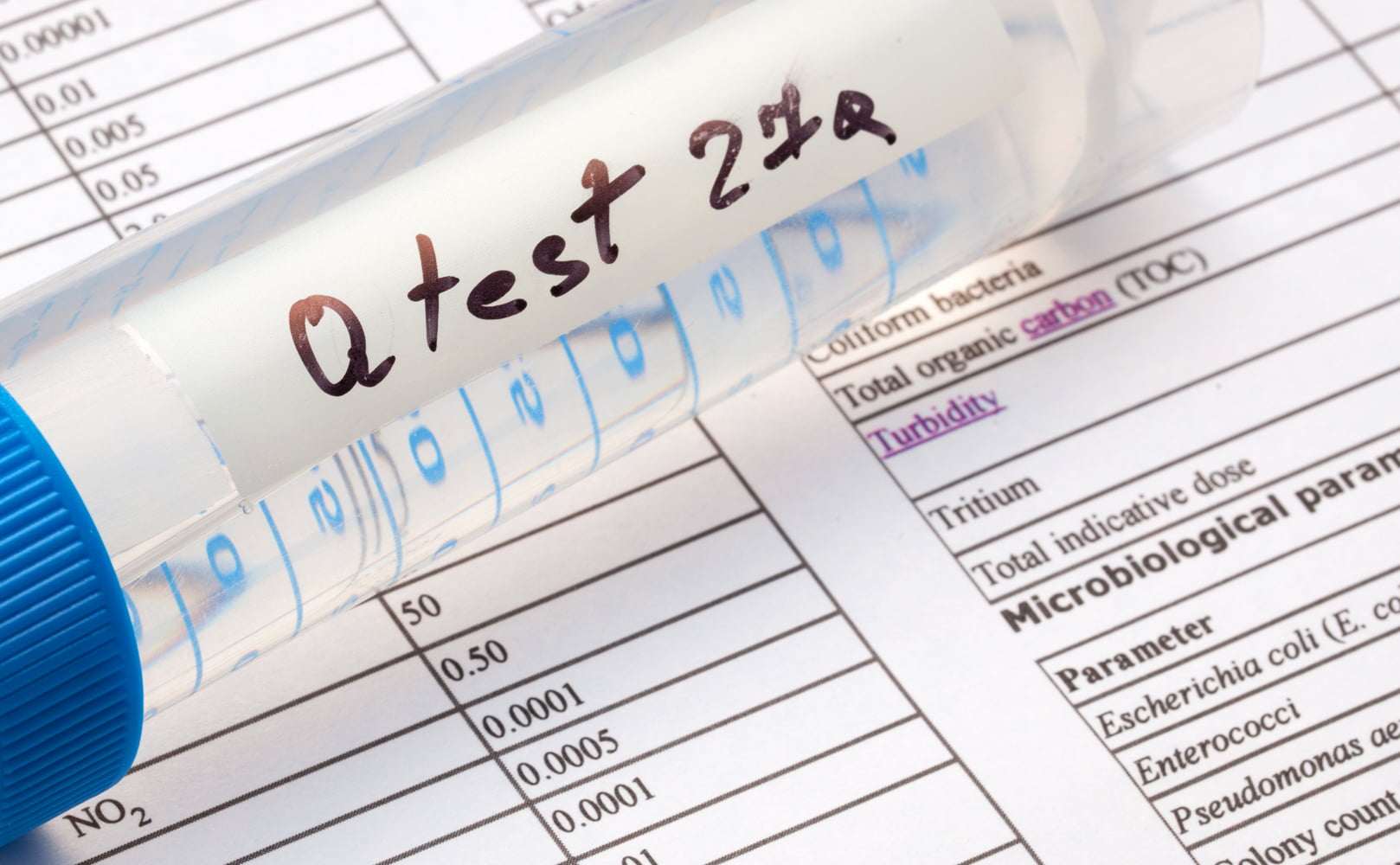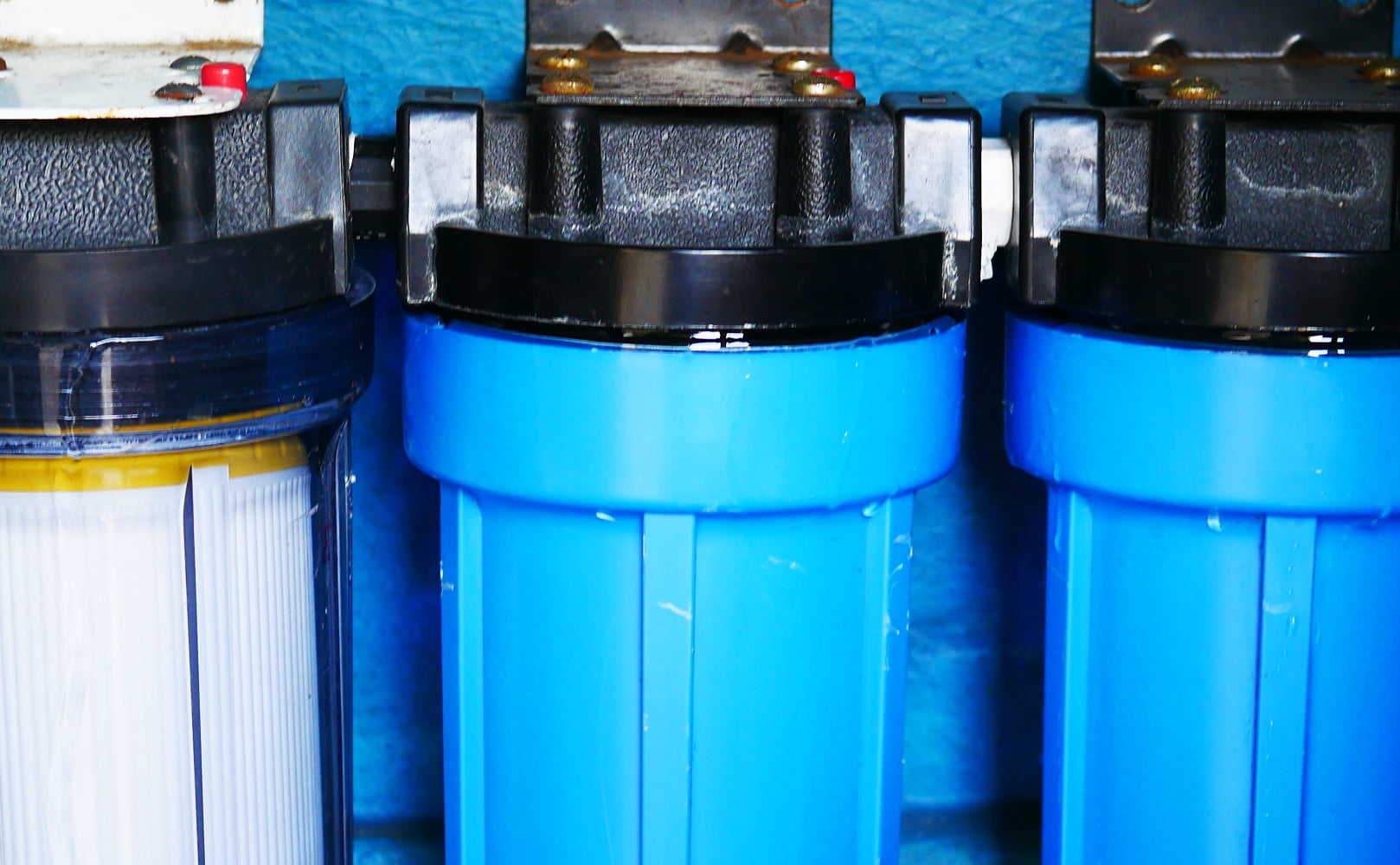7 Best Whole House Carbon Water Filters (*Update 2024)
Written by: Gene Fitzgerald // Expert Fact-Checking: Buddhini Dolapihilla, MBSS // Last Updated: Jan 31, 2024
This page may contain affiliate links. If you buy a product or service through such a link we earn a commission at no extra cost to you. Learn more.
Top Pick: What’s the Best Whole House Carbon Water Filter?
The best whole house carbon water filter in 2024 is the SpringWell CF, which protects your family and home from water contaminants for up to 1,000,000 gallons. It also improves water taste and odor, is easy to install and maintain, fast (9-20 gpm), and backed by a satisfaction guarantee and limited lifetime warranty.
Are you tired of sifting through a sea of whole house carbon water filters, unsure of which one is truly worth your investment? Well, fret no more! We’ve taken on the task of evaluating over 30 of the top-notch filters out there, so you don’t have to. From researching to testing, comparing to ranking, our team has left no stone unturned in our quest to find the ultimate carbon water filtration system for your needs.
With the inception of our buying guide on that fateful day of April 19, 2023, we’ve poured countless hours into it. Several times we’ve edited and upgraded the guide, ensuring that you have access to the most up-to-date and reliable information possible. So sit back, relax, and let us guide you towards the perfect whole house carbon water filter that will leave you with pure, refreshing water flowing through your taps.
No Time to Read? Check Our List of the Best Whole House Carbon Water Filter Systems!
| Product | Details | |
|---|---|---|
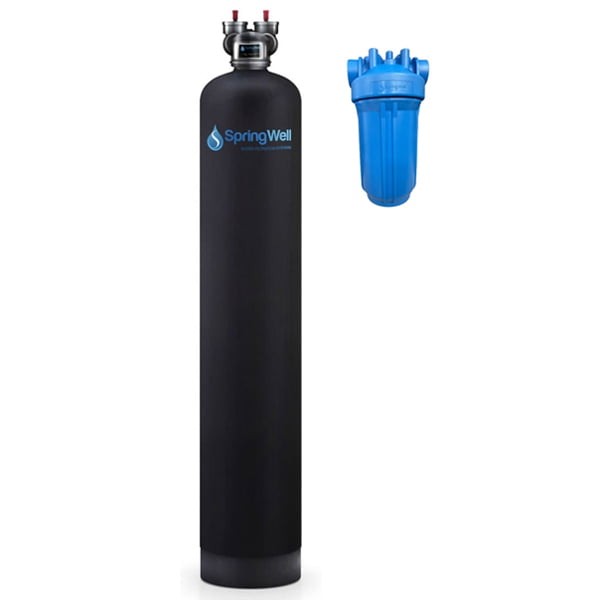 Best Overall: SpringWell CF |
Overall Rating: 5.0/5.0 ⓘRatings based on overall filtration effectiveness, flow rates, filter life, purchase and operating cost, our own testing, user opinions, customer service, warranty, and other factors.
Get 5% Off! Use Code: |
Price: $$ Carbon Type: Catalytic Carbon Flow Rate: 9-20 gpm Filter Life: 1,000,000 gal Annual Cost: ~$40 Read Review: Click Mike’s Video Review: Click |
 Runner-Up: USWS BodyGuard Plus |
Overall Rating: 4.5/5.0 ⓘRatings based on overall filtration effectiveness, flow rates, filter life, purchase and operating cost, our own testing, user opinions, customer service, warranty, and other factors.
Get 5% Off! Use Code: |
Price: $$ Carbon Type: GAC + Catalytic Carbon Flow Rate: 10-20 gpm Filter Life: 5 Years Annual Cost: $45-100 Read Review: Click |
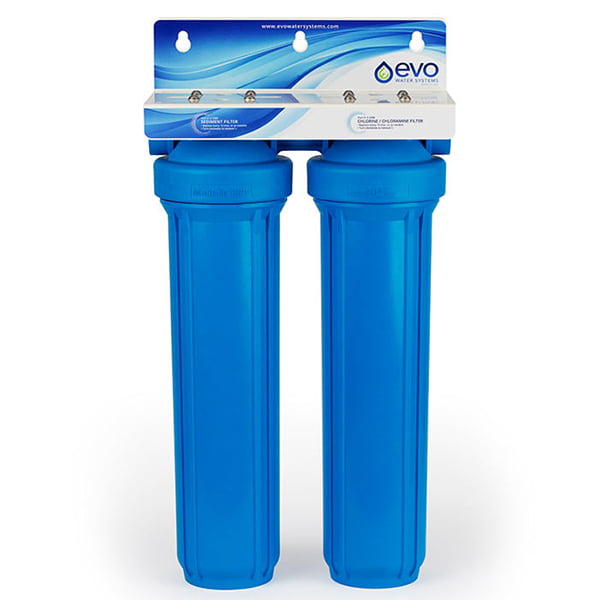 Best for Small Budgets + Cartridge-Based: Kind Water Systems E-1000 |
Overall Rating: 4.5/5.0 ⓘRatings based on overall filtration effectiveness, flow rates, filter life, purchase and operating cost, our own testing, user opinions, customer service, warranty, and other factors.
Get 5% Off! Use Code: |
Price: $ Carbon Type: Catalytic Carbon Block Flow Rate: 15 gpm Filter Life: 1 Year Annual Cost: ~$145 Read Review: Click Mike’s Video Review: Click |
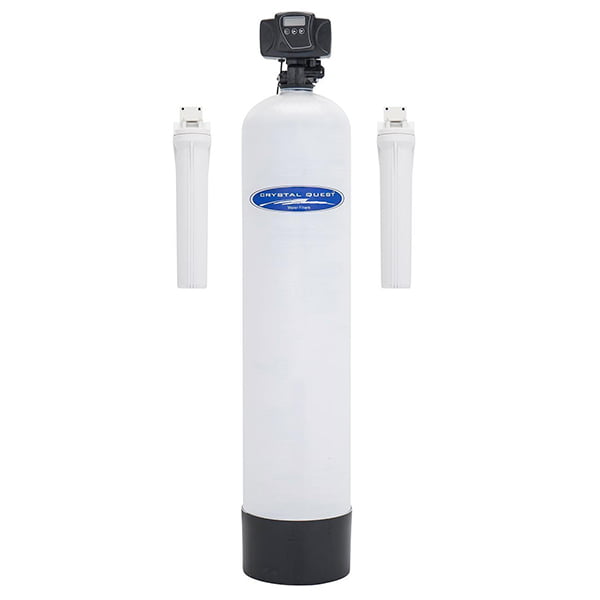 Best for Broad Contaminant Removal: Crystal Quest SMART |
Overall Rating: 4.0/5.0 ⓘRatings based on overall filtration effectiveness, flow rates, filter life, purchase and operating cost, our own testing, user opinions, customer service, warranty, and other factors.
Get 5% Off! Use Code: |
Price: $$$ Carbon Type: GAC + Catalytic Carbon + Carbon Block Flow Rate: 9-13 gpm Filter Life: 1-1.5 Million Gallons Annual Cost: ~$50-75 Read Review: Click |
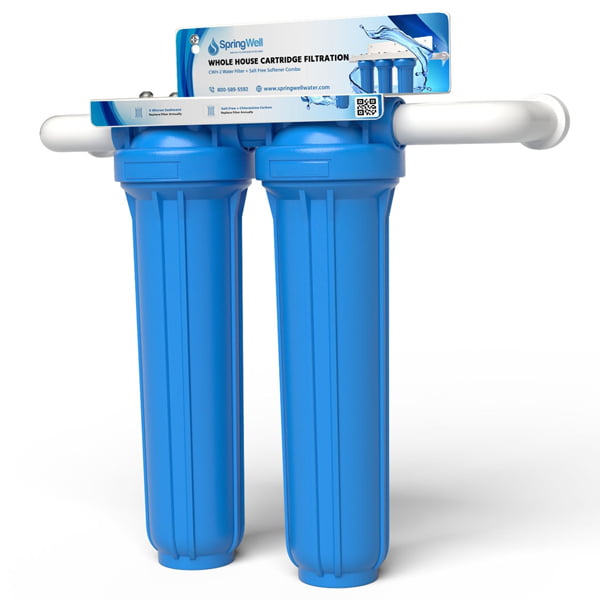 Runner-Up for Cartridge-Based: SpringWell CWH-1 |
Overall Rating: 4.0/5.0 ⓘRatings based on overall filtration effectiveness, flow rates, filter life, purchase and operating cost, our own testing, user opinions, customer service, warranty, and other factors.
Get 5% Off! Use Code: |
Price: $ Carbon Type: Activated Carbon Flow Rate: 20 gpm Filter Life: 1 Year Annual Cost: ~$130 Read Review: Click |
Whole House Carbon Water Filter Reviews
Our Top Picks
- SpringWell CF – Best Overall
- US Water Systems BodyGuard Plus – Runner-Up
- Kind E-1000 – Best for Small Budgets + Cartridge-Based
- Crystal Quest SMART – Best for Broad Filtration
- SpringWell CWH-1 – Runner-Up for Cartridge-Based Carbon Filtration
- 3M Aqua-Pure AP903 – Low-Budget Alternative
- Aquasana Rhino
1. Best Overall: SpringWell CF Whole House Carbon Water Filter System
In our opinion, the best whole house carbon water filter in 2024 is the SpringWell CF. It’s the perfect solution for removing harmful contaminants found in municipal water including chlorine, chloramine, PFOA, pesticides, and more.
Mike’s Video Review
Mike, one of our inhouse video content producers, has ordered, installed, and tested the SpringWell CF Whole House Water Filter in his own home – including lab testing for contaminant reduction rates. You cannot get more hands-on experience than that! Mike has documented the entire process and shares his findings the video below:
Other Specs
- Model: CF1, CF4, CF+
- Last Price: $1,016.44-$1,737.21
- Entire Filter Process: 5-Micron Sediment, Catalytic Carbon + KDF
- Filter Stages: 2
- WxHxD: 9-13″x52-58″x9-13″
- Water Temperature: 36-120 °F
- Water Pressure: 25-80 psi
- Fitting: 1″-1.5″
- Warranty: Lifetime (Limited)
Key Features & Pros
- The first stage is a 5-micron sediment pre-filter to remove sand, rust, clay, and the like – prevents clogging of the rest of the system.
- KDF media in the main tank removes chlorine and certain heavy metals as well as controlling the growth of algae, fungi, and bacteria.
- Next is highly potent catalytic carbon to remove chemicals and organic contaminants including chlorine/chloramine, VOCs, pesticides and, herbicides.
- Finally comes a flex bed designed to eliminate channeling.
- Excellent choice for chlorine and chloramine removal: Springwell ensures the whole house carbon filter will reduce chlorine/chloramine below detectable levels for 6 years or one million gallons.
- The filtration system maximizes contact time between the filter media and the feed water. Longer contact time equates to a more thorough filtration process and more contaminants removed.
- Springwell manufactures three different-sized filter systems:
- CF1 is their smallest unit with 9 gallons per min and is perfect for 1 to 3 bathrooms.
- CF4 offers 12 gallons per minute and is designed to filter water for 4 to 6 bathrooms.
- CF+ is their largest unit with 20 gpm and can handle 7 or more bathrooms.
- Installation can be completed on your own if you’re handy and familiar with DIY. The set comes with the necessary bypass valves as well as 1-inch elbow fittings. An in-depth video guide outlines the entire installation process for reference.
- As far as maintenance goes, the system requires remarkably little. The 5-micron sediment filter must be changed every 6 to 9 months, and the yearly cost is approximately $40.
- Springwell offers an industry-leading 6-month money-back guarantee.
- Limited lifetime warranty on all tanks and valves.
Cons
- Included fittings are plastic instead of brass or copper. These are more prone to cross-threading and leaking.
Our Rating
- Filtration Performance: 5.0/5.0
- Filter Life: 5.0/5.0
- Price: 4.0/5.0
- Maintenance Cost: 5.0/5.0
- Overall: 5.0/5.0
Best for
The Springwell CF is best when you want a high-quality, low-maintenance whole house filter with top-of-the-line catalytic carbon filtration.
→ Check Full SpringWell CF Review Here
2. The Runner-Up: USWS BodyGuard Plus Whole House Carbon Filtration System
The USWS Bodyguard Plus is a close second when it comes to whole house carbon water filters. It combines two levels of carbon filtration: Catalytic carbon and regular activated carbon. The combination of these two filter media does the bulk of the contaminant removal, eliminating chlorine, chloramine, VOCs, pesticides, herbicides, THM, and more.
Gallery
Other Specs
- Model: 117-BGP
- Last Price: $1,165.50-$1,525.50
- Entire Filter Process: Catalytic Carbon + GAC
- WxHxD: 9-12″x48-54″x9-12″
- Water Temperature: 39-100 °F
- Water Pressure: 20-100 psi
- Water pH: 5-9.5
- Fitting: 3/4″ or 1″ MPT
- Warranty: 5 Years to Lifetime
Key Features & Pros
- Made in the USA.
- Two carbon filtration stages provide a wide range of effectiveness against various water pollutants. First, prolonged contact with coconut-shell granular activated carbon (GAC) eliminates or reduces chlorine, pharmaceuticals, pesticides, VOCs, PCBs, and THM. Then, the catalytic activated carbon removes whatever is left of the above contaminants, as well as eliminating chloramine – which regular carbon filters cannot touch.
- There are two options when it comes to pre-filtration. Both remove sediment which is a must to protect the delicate carbon filter media.
- Magna: This is USWS’s cheaper 5-micron pre-filter and will only remove sand, silt, and the like.
- Interceptor: The interceptor uses a similar 5-micron outer wrap to remove sand and silt, but also features a layer of pleated electrically charged nanofiber which reduces bacteria, cysts, lead, and chromium 6.
- Three different configurations are available:
- 117-BGP-100: This model has a flow rate of 10 gallons per minute which will accommodate 1 to 3 bathrooms.
- 117-BGP-150: Flow rate of 15 gpm, which will supply 4 to 6 bathrooms.
- 117-BGP-200: Flow rate of 20 gpm, which will supply 7 or more bathrooms.
- USWS’s smart valve system and legacy view app allow you to monitor the function of your water filter remotely from your smartphone.
- Installation is fairly simple and can be completed on your own provided you have basic DIY skills. A bypass valve comes included.
- The interceptor filter is designed to be changed annually but this can be more frequent in highly contaminated environments. The carbon will last between several hundred thousand and several million gallons, depending on contaminant levels. In general, both types of carbon are recommended to be changed every 5 years.
- Lifetime warranty on tank, 10 years on valve and electronics, and 5 years on filter media.
Cons
- Replacement filters cost more than competitors.
Our Rating
- Filtration Performance: 4.5/5.0
- Filter Life: 5.0/5.0
- Price: 4.0/5.0
- Maintenance Cost: 5.0/5.0
- Overall: 4.5/5.0
Best for
The USWS Bodyguard Plus is perfect for whole house carbon water filtration, especially when your budget is less of a concern. It offers an impressive level of chlorine/chloramine filtration, making it a great choice for municipally supplied water.
3. Best Budget Pick + Best for Cartridge-Based Treatment: Kind Water Systems E-1000 2-Stage Whole House Water Filter
If you’re interested in a cartridge-based whole house carbon water filter, then you’ll have a tough time topping the Kind Water Systems E-1000. Cartridge-based systems tend to cost significantly less than traditional tank filters upfront, making them an ideal budget-friendly option.
Mike’s Video Review
Mike, one of our inhouse video content creators, has ordered, plumbed in, and tested the Kind E-1000 whole house filter in his new home – including a water quality analysis for contaminant reduction rates. 100% hands-on experience! Mike has documented the entire process and shares his findings in the video below:
Other Specs
- Model: E-1000
- Last Price: $776.12
- Entire Filter Process: 5-Micron Sediment, Catalytic Carbon
- Filter Stages: 2
- WxHxD: 15½”x29″x8″
- Water Temperature: 36-120 °F
- Water Pressure: 25-120 psi
- Fitting: 1″ FNPT
- Warranty: Limited Lifetime
Key Features & Pros
- 100% manufactured in the USA.
- A 5-micron pre-filter removes clay, sand, dirt, and other large particles which can clog your carbon filter. The 20-inch long filter is double the length of standard filters and can be rinsed out several times before it needs to be replaced. As such, the sediment pre-filter serves two functions.
- Protects your home’s appliances and extends their lifespan.
- Prevents clogging of later filter stages.
- The second – and primary – filter stage is comprised of a high-performance catalytic activated coconut shell carbon block which removes chlorine/chloramine as well as VOCs, THMs, and haloacetic acids (HAAs) among other stuff. The block design increases the contact time between the filter and the water, increasing contaminant removal efficacy.
- The filter is sold with a generous 15 gallons per minute flow rate, which is enough to accommodate 4 to 6 bathrooms.
- Installation is fairly simple and only requires two plumbing connections. If you have basic DIY and plumbing knowledge you can install it yourself. If not, any plumber or handyman will be able to complete the job with ease.
- Filter comes pre-assembled.
- Mounting hardware comes included.
- Both pre-filters and carbon filters need replacement every 12 months, which is more frequent than tanked systems, but still reasonable in terms of maintenance.
- Replacement filters are standard-sized, so you can go with off-brand filters if you want to save on maintenance costs.
- 4-month satisfaction guarantee.
- Limited lifetime warranty.
- Quick delivery.
- Top-shelf customer service.
Cons
- No bypass valve comes with purchase.
Our Rating
- Filtration Performance: 5.0/5.0
- Filter Life: 4.0/5.0
- Price: 4.0/5.0
- Maintenance Cost: 5.0/5.0
- Overall: 4.5/5.0
Best for
The Kind E-1000 is the best option when you want a highly effective whole house carbon filter – and don’t want to break the bank getting it. It’s a cartridge-based system, unlike most of the tanked systems on this list.
→ Read the Full Kind E-1000 Review
4. Best for Broad Contaminant Removal: SMART Whole House Water Filter by Crystal Quest
When it comes to broad-based contaminant removal, you’ll have a tough time finding a better system than Crystal Quest’s SMART whole house system. It offers much more than a simple carbon filter and features an impressive seven different filter types.
The complex filtration process makes this system ideal for any area with water of questionable quality.
Gallery
Other Specs
- Model: SMART
- Last Price: $1,791.00-$2,107.00
- Entire Filter Process: 5-Micron Sediment, GAC, Catalytic Carbon, KDF, Ion Exchange Resin, Ceramic Balls, Tourmaline Balls, Carbon Block
- Filter Stages: 3
- WxHxD: 10-12″x52-54″x10-12″
- Water Temperature: 35-100 °F
- Water Pressure: 20-60 psi
- Fitting: 3/4″ or 1″
- Warranty: 1 Year
Key Features & Pros
- Made in the USA.
- Like most other whole house carbon systems, the first step is removing sediment via a 5-micron pre-filter. It will trap suspended particles like sand, silt, and rust which can damage later filter stages.
- The main tank features 7 filter stages including a granular activated carbon stage, a catalytic activated carbon stage, Eagle Redox Alloy 9500 (KDF), Eagle Redox Alloy 6500 (KDF), an ion exchange resin stage, ceramic balls, and tourmaline balls.
- In addition to removing chlorine/chloramine like other carbon filters, the filter stages will remove pesticides, heavy metals including lead, sulfur, and a wide array of both organic and inorganic contaminants. The last two stages (ceramic and tourmaline balls) will oxygenate and help achieve a balanced pH level.
- A 5-micron solid carbon post-filter further removes residual tastes/odors.
- Two sizes are available:
- A 9 to 11 gallons per minute flow rate unit with a 1-million-gallon filtration capacity. (For 1 to 3 bathrooms)
- A 10 to 13 gpm unit with a 1.5-million-gallon filtration capacity. (For 2 to 4+ bathrooms)
- The system can be purchased with either a fiberglass or a stainless-steel tank casing, depending on your preference. Stainless steel will last longer but costs more upfront.
- System maintenance is fairly simple, all that’s needed is changing the pre and post-filters every 12 to 18 months.
- The warranty valid is for 1 year.
Cons
- Relatively expensive when compared to other whole house carbon filters.
- More filters mean more cartridge changes are required.
Our Rating
- Filtration Performance: 4.5/5.0
- Filter Life: 5.0/5.0
- Price: 3.0/5.0
- Maintenance Cost: 5.0/5.0
- Overall: 4.0/5.0
Best for
The Crystal Quest SMART system is the ideal choice when you want broad-based contaminant reduction. It targets a far wider range of contaminants than typical carbon filters.
5. Runner-Up for Cartridge-Based: SpringWell Sediment and Carbon Block Whole House Filter
The next best cartridge-based whole house carbon water filter system right after the Kind E-1000 is the SpringWell CWH-1 – at least in our opinion. Its filtration process is based on an activated carbon filter block.
Other Specs
- Model: CWH-1
- Last Price: $624.47
- Entire Filter Process: 5-Micron Sediment, Carbon Block
- Filter Stages: 2
- WxHxD: 15.5”x24″x9″
- Water Temperature: 36-120 °F
- Water Pressure: 42-120 psi
- Fitting: 1″
- Warranty: Limited Lifetime
Key Features & Pros
- First comes a 5-micron sediment filter cartridge for removing larger particles like silt, sand, and other dirt.
- The carbon block filter reduces chlorine, chloramine, HAAs, PFAS (PFOA + PFOS), pesticides, and herbicides, sulfur + more.
- Bottom line is the entire water in your home will taste and smell much better, it’ll be healthier to drink, and it will be easier on your hair and skin.
- 20 gpm flow rate is enough for 7 or more bathrooms.
- All installation components are included except piping. SpringWell also provides you with detailed installation instructions (including video). Ideal for DIY!
- 12-month filter cartridge life keeps maintenance low.
- Satisfaction guaranteed for 6 months.
- Lifetime warranty.
Cons
- We would have liked more information on the exact type of carbon filter media used.
Our Rating
- Filtration Performance: 4.0/5.0
- Filter Life: 4.0/5.0
- Price: 4.0/5.0
- Maintenance Cost: 5.0/5.0
- Overall: 4.0/5.0
Best for
The SpringWell CWH-1 POE carbon filter is best if you want to spend less up front, or if you’re just short on space.
6. Low-Budget Alternative: 3M Aqua-Pure AP903 Water Filtration System
The 3M Aqua-Pure water filtration system is by no means the best of the best, but when it comes to budget whole house carbon water filters, it will perform as advertised and make your water smell, taste, and look appealing.
The system is a barebones activated carbon block filter paired with a sediment pre-filter, so it won’t remove a whole lot of contaminant types, but it will greatly improve water aesthetics by removing chlorine and similar chemicals.
Other Specs
- Model: 3M Aqua-Pure AP903
- Entire Filter Process: Sediment (5 Microns), Carbon Block
- WxHxD: 4.7″22.3″4.7″
- Water Temperature: 40-100 °F
- Water Pressure: 20-125 psi
- Fitting: 1” Female NPT
- NSF Certifications: Standard 42 (Nominal Particulate Reduction, Class III)
- Warranty: 1 to 25 Years
Key Features & Pros
- An activated carbon block filter with heavy-duty non-pleat media pre-filtration (5 microns nominal) removes chlorine, chemical odors/taste, and sediments from your water. This will not only improve the aesthetics and taste of your water but will also extend the lifespan of your water heater and other appliances.
- For a budget filter, it has an exceptionally high flow rate of 20 gallons per minute. This translates to enough capacity to accommodate 7+ bathrooms.
- A corrosion-resistant 304 stainless steel head can be installed on your home’s existing copper pipes. This translates to a long service life.
- Cheap and easy to install. The unit can be placed at the main water supply to your home even if space is tight.
- 3M’s sanitary quick-change design system allows for filter cartridge changes without the need for a filter wrench or direct contact with the filter media.
- 3M states the filter will work for an impressive 100,000 gallons.
- The stainless-steel head comes with a 25-year warranty.
Cons
- Some users reported having to change the filter cartridge far more often than every 100,000 gallons. This may be an indication that further pre-treatment and more thorough sediment removal is needed.
- Barebones filter will not remove common contaminants of concern like pesticides and heavy metals.
Our Rating
- Filtration Performance: 3.5/5.0
- Filter Life: 4.0/5.0
- Price: 4.0/5.0
- Maintenance Cost: 3.5/5.0
- Overall: 3.5/5.0
Best for
The 3M Aqua Pure AP903 is perfect for those looking for basic and reliable carbon block filtration on a budget.
→ Read Full 3M Aqua-Pure Review Here
7. Aquasana Rhino Whole House Water Filtration System
Finally, the Aquasana Rhino – not the best whole house carbon water filter in our opinion, but another solid option. It pairs activated carbon with a KDF-55 media bed to remove chemicals and possibly even few heavy metals including lead.
The system is ideal for municipal water treated with chlorine/chloramine and also has a version tailor-made for homes supplied by well water.
Other Specs
- Model: Rhino WH-1000
- Last Price: $999.00
- Entire Filter Process: 20″ Sediment Pre-Filter, Activated Carbon, KDF, Post-Filter
- Filter Stages: 4
- WxHxD: 32″x46″x9″
- Water Temperature: 40-90 °F
- Water Pressure: 20-100 psi
- NSF Testing/Certifications: Standard 42 (Chlorine Reduction), 61, 372
- Warranty: 10 Years
Key Features & Pros
- Before any of the carbon filtration begins, feed water passes through a sediment pre-filter to filter out sand, dust, and other large particulate matter. This ensures the later filters won’t be damaged.
- Next comes activated carbon to remove chlorine, pesticides, and other organics. Copper-zinc (KDF-55) aids in chlorine reduction and stops bacteria and algae growth extending the lifespan of the system.
- The unit is tested against NSF standard 42 for 97% average chlorine removal for 1,000,000 gallons of filtered water (approx. 10 years).
- The flow rate is a respectable 7 gallons per minute (or 1 to 2.5 bathrooms)
- Filter replacements are easy to complete. They’re required every second month for the sediment pre-filter. The post-filter lasts 6 months.
- 10-year warranty on the water filter and components.
Cons
- The plastic fittings have been reported to leak.
- Some customers reported having issues with warranty claims.
- After having filtered several hundred thousand gallons of water, chlorine reduction goes down slightly. At the end of the filter life, it’s more like 93% (which is still good).
Our Rating
- Filtration Performance: 4.0/5.0
- Filter Life: 5.0/5.0
- Price: 4.0/5.0
- Maintenance Cost: 4.5/5.0
- Overall: 4.0/5.0
Best for
The Aquasana Rhino is ideal for thorough whole house carbon filtration focusing on chlorine removal.
→ Read Full Aquasana Rhino Review
- The Very Best Whole House Water Filters
- Get Yourself the Best Combo of Whole House Water Filter + Softener
- Best Two-Stage Whole House Water Filters
- Best Whole House Hard Water Filter Systems
- The Best Whole House Water Filters for City Water
- Get Yourself the Best Whole Home Well Water Filter!
- Best Whole House Alkaline Water Filters
- List with All Whole House Water Filters Featured on BOS
Comparison List
(Mobile Hint: Swipe to Scroll)
| Model | Price | Entire Filter Process | Water | Filtration Capacity | Annually | Warranty | Additional Info |
|---|---|---|---|---|---|---|---|
| SpringWell CF Whole House Carbon Water Filter | $$ | 5-Micron Sediment, Catalytic Activated Carbon, KDF | 9-20 Gallons Per Minute | 1,000,000 Gallons | ~$40 | Limited Lifetime | |
| USWS BodyGuard Plus Whole House Carbon Water Filtration System | $$ | Granular Activated Carbon + Catalytic Activated Carbon | 10-20 Gallons Per Minute | 5 Years | $45-100 | 5 Years to Lifetime | |
| Kind Water Systems E-1000 2-Stage Whole House Water Filter | $ | 5-Micron Sediment, Catalytic Activated Carbon Block Filter | 15 Gallons Per Minute | 12 Months | ~$145 | Limited Lifetime | |
| Crystal Quest SMART Whole House Water Filter System | $$$ | 5-Micron Sediment, GAC, Catalytic Carbon, KDF, Ion Exchange, Ceramic Balls, Tourmaline Balls, Carbon Block | 9-13 Gallons Per Minute | 1-1.5 Million Gallons; 12-18 Months for Pre and Post-Filters | ~$50-75 | 1 Year | |
| SpringWell CWH-1 Sediment and Carbon Block Whole House Water Filter | $ | 5-Micron Sediment, Activated Carbon Block | 20 Gallons Per Minute | 12 Months | ~$130 | Limited Lifetime | |
| 3M Aqua-Pure AP903 Whole House Carbon Filter System | $ | 5-Micron Sediment, Activated Carbon Block Filter | 20 Gallons Per Minute | 100,000 Gallons | ~$250 | 1-25 Years | |
| Aquasana Rhino Whole House Water Filtration System | $$ | Sediment Pre-Filter, GAC, KDF, Post-Filter | 7 Gallons Per Minute | 1,000,000 Gallons | ~$120 | 10 Years |
Buying Guide: How to Choose the Whole House Carbon Water Filter That’s Best for You
The following are key features worth considering when shopping for a whole house carbon water filter. They will help you choose the right on for your needs and budget.
Test Your Water for Contaminants and Find a Matching Filter
Whenever you purchase a water filtration system, the first thing to do is get your water tested for contaminants. This will give you a precise reading of what it is that you are facing in your home’s water supply, and allow you to tailor your filter purchase to remove these contaminants.
If your water is sourced from a private well, then the only real choice is to get it professionally tested to find out which contaminants are present. This will typically run you between $100 and $500, but you’ll get precise readings of contaminant quantities present.
You could also opt for a home well water test kit, which will give you a more general idea of contamination (heavy metals, water hardness, bacteria, etc.), but the results may be lackluster.
For municipally sourced water, you can count on water quality reports. These reports are mandatory for public water utilities to create and provide for free. They list all the contaminants detected in a water supply. Additionally, there is the EPA’s and the EWG’s Tap Water Database which both archive water quality reports and make them available online.
A professional water testing is still recommended in this scenario, however, as it will give you precise contaminant readings also taking into account contamination that might happen while the water travels from the utility to your home.
NSF Testing & Certifications
The NSF is an independent organization that conducts testing and certifications on several consumer products including water filtration systems. Whole house systems with NSF testing/certifications are somewhat rare, but if you do find one, you can be sure you’re getting the contaminant removal level advertised by the manufacturer.
Several whole house carbon water filters come with a standard 42 NSF rating, which is the standard for a filter’s ability to remove chlorine and particulate matter. The PIONEER is NSF standard 53 certified to remove lead.
Water Flow Rate
The water flow rate is a measure of the flow capacity that a filter system can provide. In other words, it measures the total quantity of water a system can filter at one time. For a whole house filter system where all of the home’s water supply will flow through the filter, it’s important to make sure the flow rate is sufficient to accommodate your usage.
Flow rate is typically measured in gallons per minute (gpm), but manufacturers will typically also include the number of bathrooms a system is capable of providing.
For a large house with 4 to 6 bathrooms, you’ll need at least 10 to 15 gpm. If you opt for a system with a flow rate that’s too low, you’ll have pressure issues when running different outlets simultaneously. On the other hand, if your purchase a system with a flow rate above your requirements, you’ll be adding an unnecessary cost.
Installation & Maintenance
Whole house carbon water filter systems are more complex to install than smaller under sink systems, but that doesn’t necessarily mean you can’t install one yourself. Most systems can be installed on your own provided you have basic DIY skills and a little plumbing knowledge. Also, manufacturers typically include the necessary bypass valves and fixtures as well as detailed installation instructions.
If you feel like installing a whole house system is beyond your skill level, then hiring a plumber to complete the installation for you is always an option.
When it comes to maintenance, all that’s generally required is occasional carbon filter cartridge changes for cartridge-based systems. Typically, cartridges must be changed every 6 to 12 months.
Space
Whole house systems must be installed where your main water line enters your home. As such, you’ll need enough space to install the system at that point.
One advantage cartridge-based systems have over tank-based systems is that the space required for installation is significantly less.
Your Budget
If you’re considering a large purchase like a whole house water filter, then budget will likely be a major consideration. While whole house carbon filters aren’t cheap, they tend to have long lifespans and capacities, so will provide a lot of value over time.
If you’re considering a whole house filter, you should be aware of the cost differences between cartridge-based systems and tank-based systems.
Cartridge-based systems have lower up-front costs, but as they require frequent filter replacements, the costs will add up significantly over time. Tank-based systems, on the other hand, have higher up-front costs, but as the tank has a longer lifespan and greater capacity, the costs tend to average lower in the long run.
Money-Back Guarantee + Product Warranties
Another significant consideration when looking at whole house carbon filter systems is the product warranty and/or money-back guarantee. As a system of this type is going to set you back at least several hundred dollars, it’s worth shopping around for a system with a solid warranty and money-back guarantee.
More on Whole House Carbon Water Filters
What Is a Whole House Carbon Water Filter?
A whole house carbon water filter is simply a point-of-entry water filter with some form of carbon filter media as part of the filtration process. These filters often feature other filter stages with different filter media, and can either be cartridge-based or tank-based systems.
Being a whole house system, these filters will remove contaminants from all of the water flowing into your home.
How Do Activated Carbon Filters Work?
Whole house activated carbon filters use a process known as adsorption to remove chlorine/chloramine, disinfection byproducts, pesticides, and all kinds of organic chemicals from your water supply. Carbon filters are also good at removing certain metals.
They are ideal for filtering water from a municipal supply, as they excel at removing water disinfectants, which are very commonly used in the water treatment process.
What Is Activated Carbon?
Activated carbon is carbon that has been treated to make it highly porous. It is produced by placing a carbonaceous source material like bamboo, coconut husk, wood, etc., in a tank without oxygen and then subjecting it to extremely high temperatures. After this, it’s exposed to various chemicals like argon or nitrogen, and then once again superheated in a tank.
Activated carbon can also be produced through a chemical process in which dehydrating agents like phosphoric acid are applied to break down the bonds binding the cellulose chains together. Then heat is applied to carbonize the material before its washed to remove any remaining dehydrating agent residue.
At this point, the carbon becomes exceptionally porous, and its adsorptive surface is vastly increased. It can readily adsorb a wide variety of organic and some non-organic contaminants.
When unfiltered water flows past activated carbon in a filter, contaminants are effectively ‘pulled’ into the tiny pores, trapping them and removing them from your water.
Catalytic activated carbon is the next step above regular activated carbon. It’s enhanced through a chemical process that renders the surface more absorbent to contaminants that can’t be adsorbed by regular activated carbon. This carbon type can remove chloramine as well as hydrogen sulfide – contaminants that can’t be readily removed by normal activated carbon.
Types of Activated Carbon Filters for the Whole House
When it comes to whole house activated carbon water filters, there are several different forms to be aware of.
Granular Activated Carbon
Whole home granular activated carbon filters are made using carbon that has been ground up into small pellets. This filter type, by its loose design, allows for a greater flow rate but is not as effective as the other type described below. As the feed water has less contact time with the carbon, there is less opportunity for the carbon to adsorb contaminants.
This tradeoff is a consideration when shopping for a whole house carbon filter. For larger homes with multiple bathrooms, granular activated carbon filters can be the preferred option due to their superior flow rate.
Carbon Block Filters
The other major filter type is carbon block filters. These filters are made from ground up activated carbon that is then bound together using a food-grade binder.
Carbon block filters are significantly more effective at removing water contaminants but offer a lower flow rate than their granular counterparts.
Catalytic Carbon
As mentioned previously, catalytic carbon whole house water filters are enhanced versions of typical activated carbon. They are available in both granular and block forms, although the block form is more common.
Why Do You Need a Whole House Carbon Water Filtration System?
Carbon filtration is the most cost-effective method for removing chlorine and chloramine from your water. This makes it an ideal choice for treating municipally-sourced water which is often treated with these chemicals.
Carbon filtration will also remove a variety of other contaminants like pesticides, herbicides, disinfection byproducts, hydrogen sulfide, VOCs, lead, and many more. It also excels at improving the taste and aesthetics of water, which is why carbon filter stages are so often included as a component of other multi-stage water filters.
Frequently Asked Questions (FAQ)
- Are whole house carbon filters worth it?
Being that carbon filters are on the cheaper side when it comes to whole house systems, there is certainly a good argument for their value. That said, like any filter system, you want to test your water to ensure a carbon filter will be capable of removing the required contaminants. - What carbon is best for water filtration?
The best form of carbon for water filtration is catalytic activated carbon. This carbon type undergoes a chemical process to enhance its filtration capabilities, which renders it effective against both hydrogen sulfide and chloramine, two contaminants that regular carbon filters have trouble with. - What are the cons of activated carbon filters?
Activated carbon filters don’t remove every contaminant from water, and usually won’t remove nitrates, water hardness, bacteria, viruses, and certain heavy metals. Their effectiveness also depends on the water flow rate, if the water passes the filter quickly, there may not be enough time for significant contaminant removal. - How long does a whole house carbon filter last?
This is a very broad question, so there isn’t a precise answer without additional information. The answer will depend on how much water you are running past the system, as well as your feed water quality. That said, most cartridge-style filters will last for about a year before needing replacement. - What do carbon filters not remove?
Whole house carbon water filtration systems can’t remove dissolved ions like heavy metals and salts very well. Granular carbon also won’t remove microorganisms like bacteria, viruses, and cysts.
While catalytic carbon filters will remove chloramine and hydrogen sulfide, other carbon filter types will not.
How We Chose and Tested the Best Whole House Carbon Water Filters (Why Trust Us)
Curious about how we determined the best whole house carbon water filters on the market? We’ve got you covered. Our team of experts meticulously crafted a methodology to ensure that only the top-performing filters made the cut. Here’s a peak:
- First, we drew upon our extensive experience and research to create a list of 19 essential criteria. These attributes became our measuring stick for evaluating each product.
- With our criteria in hand, we scoured the internet and our database for the most promising whole house carbon water filters, resulting in a staggering 30+ options.
- To truly understand the capabilities of each filter, we delved into product manuals, descriptions, and third-party certifications. Additionally, we engaged with the leading brands (SpringWell, USWS, and Kind among others), conducting interviews to test their customer support and gather insights as potential buyers. This thorough process allowed us to narrow down our selection to less than 20 systems.
- But we didn’t stop there. We sought feedback and third-party ratings from real users across different platforms, diligently sifting out any fraudulent reviews. This rigorous approach ensured that only the best products remained in contention.
- With 7 exceptional products left, we took our investigation to the next level. We personally ordered and installed some of these filters, immersing ourselves in the experience. We examined every aspect, from how well the manufacturer detailed the installation process to filtered water taste & odor to ongoing performance, with each filter operating for at least four weeks. No detail was overlooked.
- To provide further assurance, we ordered water test kits using Tap Score and similar services. This allowed us to determine the real-life contaminant reduction rates of each filter.
- Finally, we synthesized all of this valuable information. Our goal was to present a clear and concise overview, highlighting the pros and cons of each filter.
Rest assured, all the information and ratings presented here are completely independent and unbiased. We take the accuracy of our content seriously, enlisting professionals to fact-check our findings. Buddhini Dolapihilla, MBSS was involved in verifying third-party certifications and other test data.
About Our Ratings
We’ve rated each filter on a score of 1 to 5, with 5 being the highest rating.
Currently, our evaluation is mostly based on these key factors: Contaminant reduction (25%), filter life (20%), water flow rates (20%), affordability including filter replacement cost (15%), direct testing and user opinions (10%), customer service and warranties (10%).
Questions? Ask away!
Information provided on BOS is for educational purposes only. The products and services we review may not be right for your individual circumstances.
We adhere to strict editorial guidelines. Rest assured, the opinions expressed have not been provided, reviewed, or otherwise endorsed by our partners – they are unbiased, independent, and the author’s alone. Our licensed experts fact-check all content for accuracy. It is accurate as of the date posted and to the best of our knowledge.

